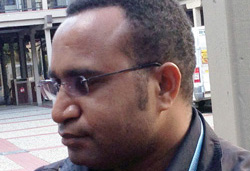
SYDNEY (Channel 7 / Pacific Media Watch): Huge amounts of Australian taxpayers' money, supposedly supplying aid to Papua New Guinea, are being lost to corruption.
An estimated A$1.7 billion of Australian aid has been "stolen" from Papua New Guinea's budget annually, according to Channel 7’s Today Tonight programme.
The stolen money was then brought to Australia to be hidden in banks and the Queensland property market.
Around 59 people have already been charged with corruption offences in Papua New Guinea, and it was alleged much of their illegally obtained money was spent in Cairns.
Money laundering expert, Professor Jason Sharman of Griffith University, and Sam Koim, head of the anti-corruption task force in Papua New Guinea, were on a mission to lift the lid on billions of dollars of dirty money leaving Papua New Guinea to be laundered in Australia.
"Corrupt politicians and senior officials are buying houses and gambling. Obviously they need bank accounts to do so, and setting their families up here (in Australia) as well," Professor Sharman said.
"Most of Australia's aid programme is effectively wasted."
Stolen budget
Koim said they have a number of prominent politicians and businessmen on their radar.
"Almost half of the budget is being stolen. That is how big the problem is," Koim said.
"They see Australia as the Cayman Islands. They see that it is the safest place where they can bring their stolen money from PNG."
There are more than 100 homes in Cairns that belong to Papua New Guineans, and a similar number in Brisbane.
They inhabit some of the nicest suburbs, and include prominent Papua New Guinean politicians and officials.
One such home in Cairns, valued at A$585,000, belongs to the Minister for Petroleum and Energy, William Duma.
Australia's banks had a strong presence in Papua New Guinea, and Koim said the banks were well aware of the corruption.
"The writing is on the wall. There is some clear evidence of suspicious transactions, but they (the banks) turned a blind eye and accepted those transactions," Koim said.
Corruption investigation
Koim and his task force informed Australia's money laundering agency Astrac, the Australian Federal Police (AFP) and the Attorney-General's department in August last year that Paul Paraka - a lawyer who allegedly sent $2.5 million dollars to his family - was a person of interest in their investigation into corruption.
However, Paraka was still able to transfer hundreds of thousands of dollars to his wives and girlfriends through the National Australia Bank.
In a statement, the National Australia Bank claimed to take money laundering seriously.
They admitted that following an investigation in late 2012 "some customer's accounts were closed and some payments originating from PNG were declined..."
Professor Sharman said few Australians realise how serious Papua New Guinea’s corruption problem was for Australia. He said for every dirty dollar harboured, Papua New Guinea was one step closer to ruin, with huge consequences.
"If you give A$10 million to a hospital and that money comes in as aid through the front door, and at the same time, A$10 million is stolen out the back door through a corrupt official, then the net benefit of Australian aid is zero," Professor Sharman said.
"If half the budget is stolen, there is a real risk that PNG as a country will simply collapse.
One of the things associated with state failure is massive refugee flow. If you were looking to escape PNG, the closest country is Australia.
"So rather than PNG being a refugee solution, it will become a massive refugee problem."
Cafe Pacific on the PNG money-laundering
This work is licensed under a Creative Commons Attribution-NonCommercial 3.0 New Zealand Licence.




